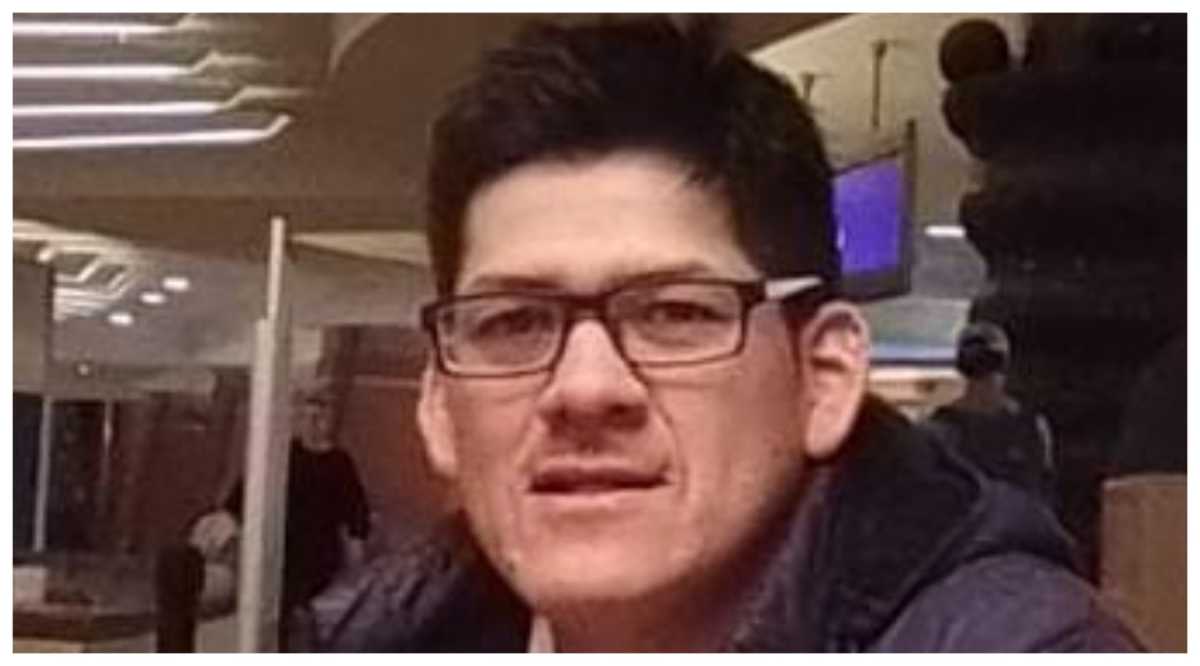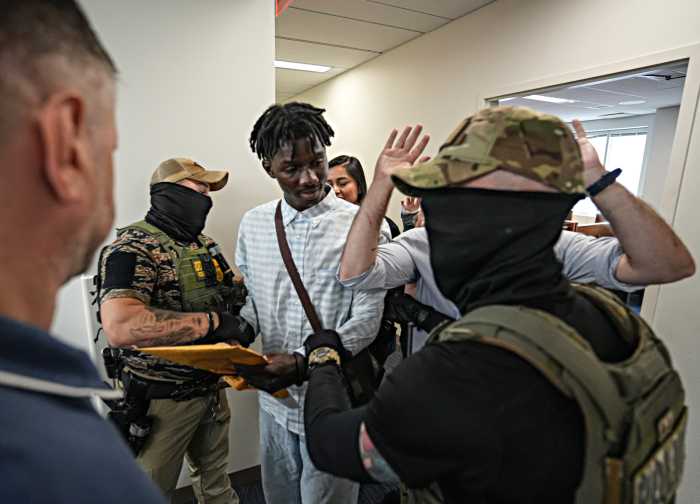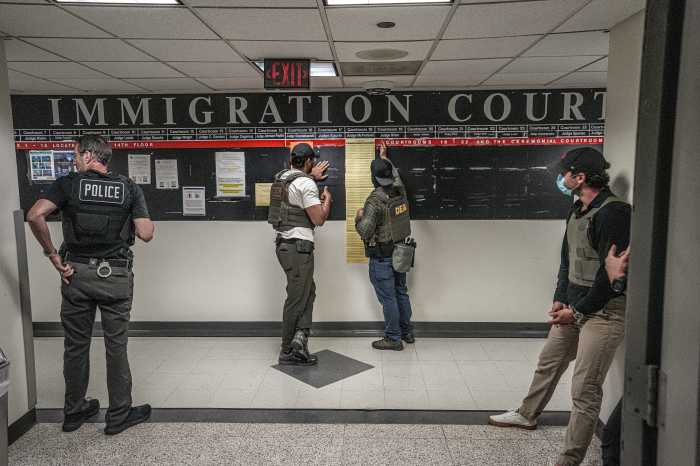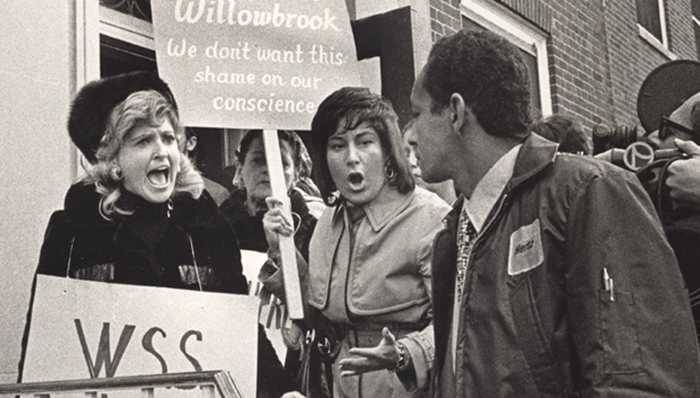A 31-year-old Peruvian asylum-seeker with developmental and auditory disabilities was held in immigration detention for more than a week, without contact with his attorneys or family, after being arrested by ICE following a routine court hearing in Manhattan.
Edwin Velasquez Munoz, who had been living in Long Island with his sister and cousin, his primary caregivers, was detained on July 2 after attending an immigration court hearing, according to his attorneys at the New York Legal Assistance Group (NYLAG).
“We were told for over a week he was in transit,” said Melissa Lim Chua, co-director of NYLAG’s Immigrant Protection Unit. “Because he was in transit, we had to wait until he was somewhere permanent, essentially not in transit, before we could speak to him.”
Chua said ICE had not responded to repeated requests for his whereabouts. NYLAG filed a habeas petition and a request for a bond hearing, but was still unable to confirm Velasquez’s location until July 10, when ICE finally acknowledged that he was being held at the Metropolitan Detention Center in Brooklyn.
“We still have not been able to speak with him,” Chua said, noting that a bond hearing is now scheduled for July 14.
The Department of Homeland Security did not respond to requests for comment regarding the detention of Velasquez Munoz and other individuals mentioned in this article at the time of publication.
Asylum seeker was ‘doing the very thing he was supposed to do’
According to Chua, Velasquez Munoz entered the U.S. in March 2024, has an active asylum application, and has complied with all legal requirements.
“He was doing the very thing he was supposed to do, which is go to court on the date they are called to litigate the claim,” she said.
NYLAG attorneys said his detention is especially concerning due to his disabilities.
“He needs special support to be able to hear properly,” Chua said. “They’re concerned that he doesn’t really understand the nature of what’s happening or what’s going on.”
His family was “extremely worried,” she said, adding that his caregivers had no contact with him during the time he was listed as “in transit.”
Speaking to amNewYork, Chua also raised broader concerns about ICE’s growing use of the “in transit” designation, which she said has been used to deny access to legal counsel.
“That period of time was generally short,” she said of past practices. “The prolonged nature — many, many days now — is of a different variety than we have really seen.”
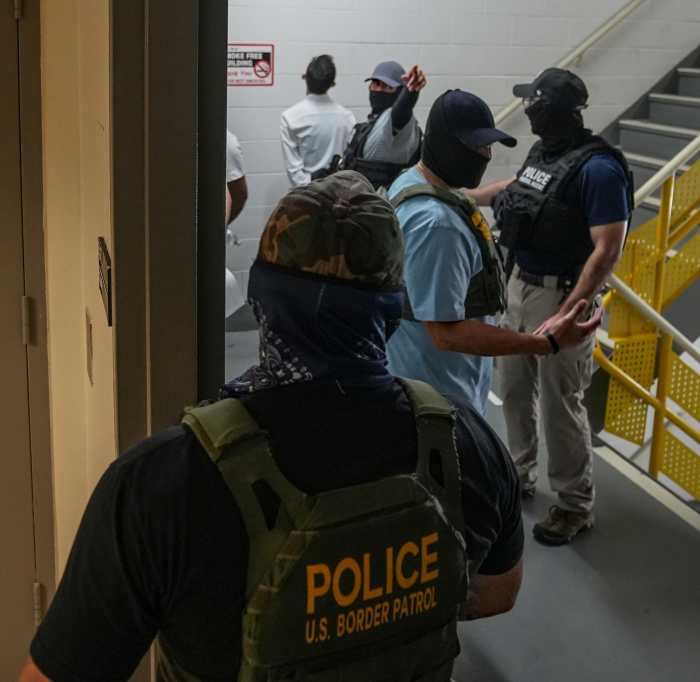
No criminal record
Velasquez Munoz is one of at least four recent NYLAG clients arrested by ICE despite having active asylum applications and no criminal records.
All were detained either during or immediately after immigration court appearances, a pattern NYLAG says reflects a broader campaign by the Department of Homeland Security to target immigrants present in the U.S. for under two years, even if their cases are ongoing and lawful.
“These are not people evading the system,” Chua said. “They are doing exactly what they’re supposed to do — attending hearings, submitting asylum claims. Every one of our clients had valid, timely asylum applications and was arrested while trying to litigate their cases.”
Chua said NYLAG has documented multiple cases of immigrants held in degrading conditions at 26 Federal Plaza. Clients reported being confined for days with little food, no beds, and no privacy.
“We’ve had clients forced to sleep sitting up, bleeding internally due to past surgeries, or denied medications,” she said.
Among them is 19-year-old Derlis Snaider Chusin Toaquiza, a member of the Indigenous Panzaleo tribe in Ecuador, who was arrested by ICE on June 4 after attending his first immigration court hearing at 26 Federal Plaza.
After his arrest, Derlis was confined in an overcrowded room with more than 60 others, according to court filings. The space was so packed that he couldn’t lie down and was forced to sleep sitting up.
The only bathroom was in an adjoining room with no door, just a waist-high partition offering limited privacy. His attorneys said he remained there for two days and received only two meals during that time.

He was then moved to a gymnasium within the same facility, also overcrowded, where there were no beds, blankets, or room to lie down. For two more days, he slept on the hard floor among unfamiliar adults. Again, he received just one meal per day. Despite notifying ICE officers that he suffers from gastritis and required additional food for medical reasons, no accommodations were made, court filings claim.
Chua said his claims are consistent with other NYLAG clients’ descriptions of deteriorating conditions at the facility. Derlis was later transferred to an ICE facility in Livingston, Texas, without notice.
According to his attorneys, Derlis had been thriving before his detention. He was enrolled at Grover Cleveland High School in Queens, where he had recently received a “Most Improved Student” award, which his mother accepted on his behalf. He was active in school and church, helped care for his younger siblings, and was fully complying with immigration requirements.
“Both his parents were nonstop and were talking about essentially foregoing food so that they could pay an attorney to get him out of detention,” Chua said.
“He is 19, he’s being held in an adult facility, and so he’s surrounded by people who are much older than him,” Chua said. “His family is extremely concerned and desperate to get him out.”
NYLAG has since secured a new bond hearing for Derlis, scheduled to occur within days in Texas. His attorneys argue his detention, like others’, violates the Fifth Amendment’s guarantee of due process.
City pushes for release of students
The bond hearing comes as Derlis became the third New York City resident in ICE detention for whom the city’s legal department has filed an amicus brief in support of release.
Another is Dylan Lopez Contreras, a 20-year-old senior at Ellis Preparatory Academy in the Bronx who was detained by ICE in May. The Venezuelan-born student is also represented by NYLAG. Before his detention, he was pursuing asylum and Special Immigrant Juvenile Status.
Chua said they are hopeful there will be progress in Dylan’s case “any day now.”
“We are waiting now for the district court judge to decide whether she wants to hear argument or just make a decision on the papers,” she said. “She could order a release, she could order a bond hearing, or she could deny — in which case we are planning to appeal.”
She said the city’s amicus briefs for students like Dylan and Derlis “underscore how important they see each student to the larger Department of Education community,” adding, “We’ve been really thankful for their support in those cases.”
The third student backed by the city is Jose Luis Rojas Figuera, a Venezuelan national and former student at Pan American High School in Elmhurst, Queens. He is represented by Make the Road New York and remains in a detention center upstate.
But the city has remained silent on many other cases, including Velasquez Munoz and Joan Paul Alcivar De La Cruz.
Alcivar De La Cruz, a 28-year-old Ecuadorian asylum-seeker, was detained on June 25, minutes after an immigration judge in Manhattan set a future hearing in his pending asylum case. Despite having filed a timely application and being scheduled for a future court date, he was surrounded by agents and detained without explanation, according to legal filings.

One of those witnesses was his wife, Samara, a U.S. citizen who was pregnant with their first child. An NYLAG attorney present at the scene said Samara collapsed in panic, visibly shaking and crying as she watched her husband be taken away.
In the weeks after his detention, Samara was hospitalized twice for dangerously high blood pressure, suffered multiple seizures, and ultimately miscarried the pregnancy. She attributes the medical complications directly to the trauma and stress caused by her husband’s arrest and detention.
The couple had also been raising Samara’s 2-year-old daughter from a previous relationship.
“She misses him,” Chua said. “This has been emotionally devastating. And Joan was the family’s primary caregiver.”
Joan has also experienced serious medical issues in custody. The habeas petition reports he began defecating blood while detained and was hospitalized at NewYork-Presbyterian Lower Manhattan Hospital before being returned to ICE custody at 26 Federal Plaza.



